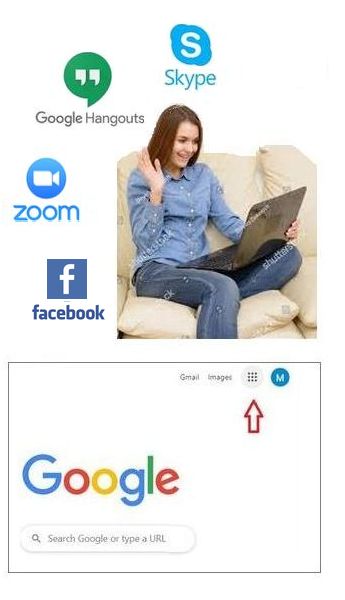
 We're all into social distancing, right? And scrubbing hands while singing "Happy Birthday" (twice, yes?).
We're all into social distancing, right? And scrubbing hands while singing "Happy Birthday" (twice, yes?).
Book clubs are affected by the VIRUS, of course. So if you haven't canceled future book club meeting(s), you may be doing so soon.
But don't give up. You can still meet using group VIDEO MEETINGS via Skype, Google Hangout, or Zoom. *
The apps are FREE … and will accommodate up to TEN PEOPLE. Zoom will handle more, but limits you to 40 minutes. All are fairly easy to set up.
Follow the app's instructions. If you run into trouble try site Support or Help … or reach out to an 11-year-old (after all, they're not in school).
♦ GOOGLE HANGOUT (see photos)
1. Go to Google's home page
2. Click on the app in the top right corner.
3. Scroll down the menu till you find "Hangout."
4. Click on the icon to open it up.
♦ SKYPE (click on links below)
1. Go directly to Skype to download the app.
2. Watch this intro video at Tech Boomers. It's not great, but it's better than others.
♦ ZOOM
1. Go directly to Zoom to download the app.
2. Watch this intro video on YouTube. It's pretty thorough.
And there's always Facebook. Facebook launched its video chat in late 2016, but it's limited to 6 PEOPLE at a time (although more can listen in). If you've already set up a private a Facebook GROUP, click on the "video" icon in the upper-right-hand corner to join an ongoing chat or start a new one.
Whatever you decide, dear readers, STAY WELL—and that goes for your families and friends, as well.
See Meeting in the Time of Corona—Part 2
♥ Thanks to my daughter, who's younger than I am… and smarter. This post was at her suggestion.
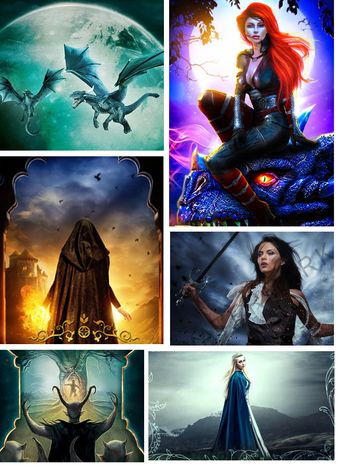 Do the threads of your life feel a little worn? Routines a little DULL? Do you ever dream about "livin' large"?
Do the threads of your life feel a little worn? Routines a little DULL? Do you ever dream about "livin' large"?
What about living in a different world altogether? Ever think about that? SURE you do.
All of which is why FANTASY is so addictive: it's a portal into a wild, mysterious otherworldliness—life lived as GRAND EPIC—exactly what most of our lives aren't.
Fantasy authors get it—it's why they're scooping up readers by the shovel-load. I'm talkin' about you, Leigh Bardugo.
But here's what really tickles me about fantasy books: the TITLES, their grammatical structure (oh yeah, and "Blood"). Like these—Children of Blood and Bone… or House of Earth and Blood. Here's the format:
(noun) - OF - (noun) - AND - (noun)
Other titles aren't quite so ramped-up; their STRUCTURE is simpler. Still, they manage to pack a punch—as in Shadow and Bone… or Siege and Storm. This is the format:
(noun) - AND - (noun)
So this got me to thinking—what would it take TO REWRITE some actual book titles, fitting them to the routines and irritants that make up our days? Here's my go:
A Song of Ice and Fire (George R.R. Martin)
A Bag of Ice and Cheetos
Children of Blood and Bone (Tomi Adeyemi)
Children of Blood and Boogers
Teens of Mess and Mayhem
Days of Blood and Starlight (Laini Taylor)
Days of Traffic and Potholes
Nights of Tossing and Turning
Song of Blood and Stone (L. Penelope)
Netflix of Blood and Gore
House of Earth and Blood (Sarah J. Maas)
House of Dust and Dirt
Sink of Pots and Pans
Eagles and Empire (Alan Smale)
Pigeons and Poop
Shadow and Bone (Leigh Bardugo)
Sinew and Flab
Siege and Storm (Leigh Bardugo)
Binge and Gorge
Ruin and Rising (Leigh Bardugo)
Bedhead and Biscotti
Book groups could have fun with this, too. See what you come up.
 Well, tickle us pink! Three of LitLovers Featured Book Clubs were selected from our line-up (of nearly 100 clubs) to appear in O, THE OPRAH MAGAZINE. The groups are highlighted in an article titled "Book Clubs That Made a Difference."
Well, tickle us pink! Three of LitLovers Featured Book Clubs were selected from our line-up (of nearly 100 clubs) to appear in O, THE OPRAH MAGAZINE. The groups are highlighted in an article titled "Book Clubs That Made a Difference."
From O, the Oprah Magazine
February 2019 issueSure they foster friendships (and a certain amount of wine consumption). But Book clubs also increase our compassion, strengthen our connection to the world around us, and maybe even keep us in shape. Join us as we explore fellowship that can be profound beyond words.
1. Becoming Jane Austen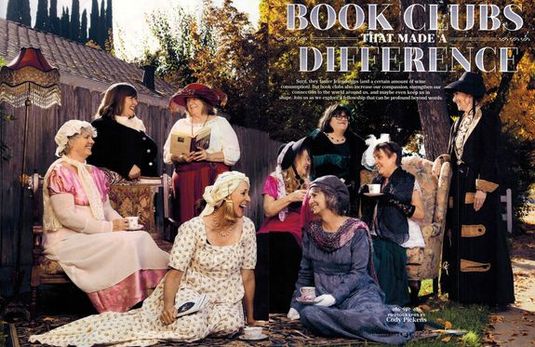
Avid Janites in Modesto, California, read through Jane Austen's entire oeuvre—then realized there were plenty more treasures lying in wait. So they kept digging and found the likes of Victor Hugo, Charlotte Bronte, Thomas Hardy, E.M. Forster, and many more. Read here to learn more about Becoming Jane.
2. The Walking Book Club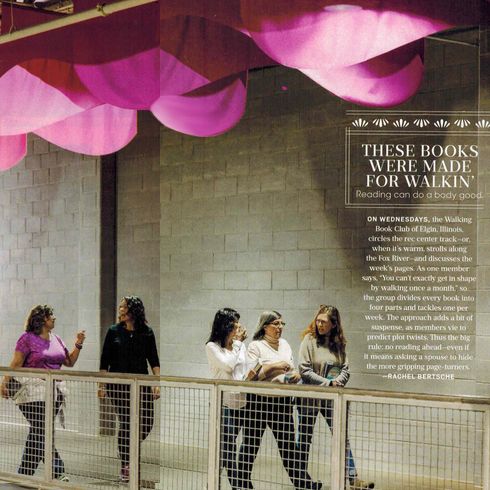
Building muscles for both brain and body, this Elgin, Illinois, group meets weekly to walk and talk. Dividing their books into four sections means NO reading ahead: if you're desperate, then turn the book over to your husband so he can hide it from you. Read here to learn more about the Walking Book Club.
3. Speaking Volumes
"A book club for those without sight"—this Massachusetts group corals area volunteers for its weekly on the air book club. Produced by Audio Journal out of Wooster, the audio books are announced well in advance and then scheduled for on air discussion by volunteers. Read here to learn more about Speaking Volumes.
 There are so many—they're the unsung heroes—WOMEN who made astonishing contributions to science and to the Allied war efforts.
There are so many—they're the unsung heroes—WOMEN who made astonishing contributions to science and to the Allied war efforts.
For half a century or longer, their lights were hidden under bushels—but not by their own doing.
Their accomplishments went unrecognized, were dismissed, in some cases, ridiculed … and for one reason: they were FEMALE.
Thankfully, today, many are finally getting the recognition they deserved yet were so long denied. Their achievements have been heralded through a profusion of recent books. It's time.
Let's start in 2016 with Hidden Figures, Margot Lee Shetterly's book about the black female mathematicians at NASA during the early rocket age: they struggled in the face of both sexism AND racism—a doubly high barrier.
Though Hidden Figures is hardly the first book about unrecognized women, it's perhaps the most famous. In addition to reaching bestseller status, the book also became a BLOCKBUSTER FILM—earning close to a quarter of a BILLION world-wide.
This January Marie Benedict published The Only Woman in the Room, a novelistic treatment of the famous Hollywood film star, Hedy Lamarr. Lamarr led a double life: she was also a crack scientist who invented a radio-guided torpedo system.
Although dismissed by the military during World War II, Lamarr's invention later played a role in developing GPS and cell phones. Hedy's Folly, a nonfiction work on the same subject, was published by Richard Rhodes in 2011.
Also out this January is Larry Loftis' nonfiction account of Odette Samson, a female British spy dropped into Nazi territory—Code Name: Lise.
AND get this! Pam Jenoff has just released a FICTIONAL treatment of real life female British spies … dropped into Nazi territory—The Lost Girls of Paris.
THIS just in, a late entry: April 9, 2019, saw the release of Sonia Purnell's A Woman of No Importance: The Untold Story of the American Spy Who Helped Win World War II.
2017 saw a number of books about female breakthroughs in male domains. CODE-BREAKING proved a big topic that year: strangely, TWO nonfiction works were both devoted to one woman in particular—Elizebeth Smith Friedman.
Elizebeth, a groundbreaking cryptologist, founded along with her husband the modern science of cryptology prior to and during WWII. After the war William Friedman went on to head up NSA's cryptology unit—and even had a building named in his honor. It took decades for Elizebeth's name to be added to the plaque—even though some considered her the BETTER coder.
Check out these two nonfiction works on Elizebeth Smith Friedman:
• The Woman Who Smashed Codes by Jason Fagone
• A Life in Code by G. Stuart Smith
In the VERY same year (we're still in 2017), came Code Girls by Liza Mundy. Again, during the war years, the Army and Navy recruited women from around the country to learn code-breaking. They moved to Washington to take up the challenge, and only now, after years of secrecy, are we learning of their impressive contribution.
Also, in 2017, Jennifer Chiaverini came out with The Enchantress of Numbers, a fictional telling of Ada Lovelace, daughter of poet Lord Byron. More than a century passed before Lovelace was acknowledged as the developer of computer language (i.e., code). That's right, she was essentially the FIRST computer programmer—and it was the 19th century!
Finally, in 2017, moving away from math and science, Chuck O'Brien released Fly Girls, a nonfiction account of female aviators during the 1920s and '30s. The women, talented flyers in their own right, had to fight in order to compete against men in popular air races. In the face of ridicule, they managed to beat their male counterparts … a lot.
This is hardly an exhaustive list, but I'll stop here. There are many more books championing unsung female achievements; these are just the ones that came to mind.
So wouldn't it be a great idea to spend an ENTIRE BOOK CLUB YEAR reading about these remarkable women … and the many others I've left out?
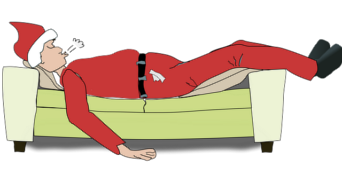 Favorite week of the year—the week AFTER Christmas. It's time to collapse … because we can. Finally.
Favorite week of the year—the week AFTER Christmas. It's time to collapse … because we can. Finally.
I wonder how many feel the same kind of dread I do as we move into November: knowing that Christmas is getting closer… closer… closer…
And that means gift shopping, food shopping, cooking, baking, wrapping, cleaning up, washing up (bowl after pot after pan), making up guest beds, trudging up to the attic or digging through closets to drag out boxes of decorations, decorating, setting the table, more cooking, more baking, more cleaning, and more washing up.
And all this is ON TOP OF the regular tasks of our day-to-day lives—which, let's face it, are already plenty busy.
None ot this is to denigrate the deep joy the season brings, spiritually and communally—the candle-light services, the gorgeous music, and the connection with family and friends.
But when it's over—the gifts opened, the dishes done, the visitors come & gone—it's time to LIE BACK on a couch, put up those weary feet, pick up a BOOK AND READ.
So Merry (WEEK AFTER) Christmas, everyone—it's the best time of the year!
